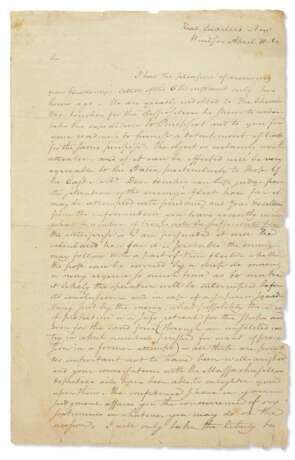ID 517693
Lot 47 | To Rochambeau on a proposed expedition to the Penobscot
Valeur estimée
$ 20 000 – 30 000
Two pages, 336 x 208mm (horizontal fold separation repaired, minor tears and chips along margins). Body of the letter in the hand of Alexander HAMILTON (1755-1804).
Washington to Rochambeau: a proposed French expedition to the Penobscot. In the spring of 1781, officials from Massachusetts approached Rochambeau with a proposal to attack the British post at the mouth of the Penobscot river—established in June 1779 to secure timber for shipyards in Halifax and to protect Nova Scotia from any American advance. On 6 April, Rochambeau informed Washington he was willing to send a detachment of troops and that Admiral Destouches was willing to offer naval assistance. But observing that he was under Washington's command, he would await his approval before approving the action (Rochambeau to Washington, 6 April 1781, Papers of George Washington, Library of Congress). Washington responds offering his gratitude that Destouches, who had only recently lost a naval engagement with the British in an unsuccessful attempt to relieve Lafayette in Virginia (see preceding lot in this sale), would be willing "to undertake the expedition to Penobscot and to you for your readiness to furnish a detachment of troops for the same purpose. The object is certainly worth attention and if it can be effected will be very agreeable to the States, particularly to those of the East."
He trusts that Destouches "can best judge from the situation of the enemy's fleet how far it may be attempted with prudence, and Your Excellency from the information you have recently received what number of troops will be sufficient for the enterprise—I am persuaded it will be calculated how far it is probable the enemy may follow with a part of their fleet—whether the post can be carried by a coup de main, or may require so much time as to make it likely the operation will be interrupted before its conclusion—in case of a superior squadron being sent by the enemy what possibility there is of protection or a safe retreat for the ships and even for the land force (through an unsettled country in which numbers perished for want of provision in a former attempt)—All these are points too important not to have been well weighed, and your conversations with the Massachusetts deputies will have been able to enlighten you upon them." Washington was referencing the unsuccessful attempt by Massachusetts in 1779 to destroy the post, abandoned when British ships with reinforcements forced an arduous overland retreat by the Americans.
Despite his assurances that Rochambeau and Destouches had matters well in hand, Washington took the "liberty to remark [on] two things—one that it appears to me frigates without any ships of the line will answer the purpose as well as with them and less will be risked than by dividing the body of the fleet. Frigates (especially the forty fours) will afford a safe escort to the troops against any thing now in those Seas, and with respect to a detachment from the enemy's fleet, it would be always proportioned to the force we should send and if we have two sixty fours, they would even be an object for their whole fleet. The other observation I would make is, that dispatch being essential to success, it will in my opinion be adviseable not to depend on any cooperation of the Militia, but to send at once such a force from your army as you deem completely adequate to a speedy reduction of the post. The country in the neighbourhood of Penobscot is too thinly inhabited to afford any resource of Militia there, and to assemble and convey them from remote places would announce your design—retard your operations, and give leisure to the enemy to counteract you. Indeed I would recommend for the sake of secrecy to conceal your determination from the State itself."
On 15 April Rochambeau replied to Washington observing that while he had sufficient troops to spare, "your Excellency’s observations upon the Separation of our fleet, and upon the danger to be interrupted by superior forces, during the course of the Expedition, which Mr Destouches does not Look on as possible to be undertaken with his frigates only, are the motives which cause this project to be Laid aside for the present moment." (Rochambeau to Washington, 15 April 1781, Papers of George Washington, Library of Congress). Soon Washington and Rochambeau's attention returned again to Virginia, and within months their combined forces would be closing in on Yorktown.
The only communication between the storied commanders of the Yorktown campaign to appear at auction in more than a century. The vast majority of the letters from Washington to Rochambeau were kept by the Rochambeau family until 1952 when the collection was sold to H.P. Kraus, who in turn sold them to Paul Mellon in 1958. In 1992, Mellon bequeathed the collection to Yale University and it is now housed at the Beinecke Library. The only other communication from Washington to Rochambeau that can be found in auction records was part of the Collection of James Crimmons (Anderson Galleries, 5 May 1904), being Washington's 13 July 1781 instructions (A.D.S) to Rochambeau for the reconnaissance in force of the British defenses around northern Manhattan. Provenance: Charles-René-Dominique Sochet Destouches – by descent to the consignor.
| Adresse de l'enchère |
CHRISTIE'S 20 Rockefeller Plaza 10020 New York Etats-Unis | ||||||||||||||
|---|---|---|---|---|---|---|---|---|---|---|---|---|---|---|---|
| Aperçu |
| ||||||||||||||
| Téléphone | +1 212 636 2000 | ||||||||||||||
| Fax | +1 212 636 4930 | ||||||||||||||
| Conditions d'utilisation | Conditions d'utilisation | ||||||||||||||
| transport |
Service postal Service de messagerie ramassage par vous-même | ||||||||||||||
| Modes de paiement |
Virement bancaire | ||||||||||||||
| Heures d'ouverture | Heures d'ouverture
|





